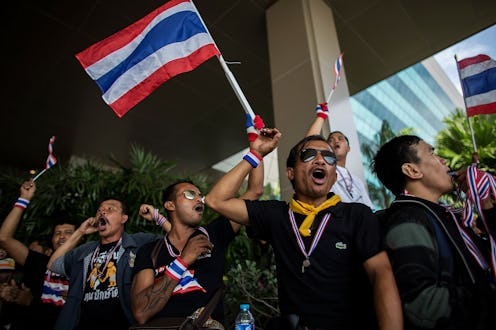News
Over 1000 Thai Protesters Break into Army Compound
It's now the sixth day of protests in Thailand, and demonstrators are going strong. On Friday morning, over a thousand anti-government protestors stormed the national army headquarters in the latest effort to oust Prime Minister Yingluck Shinawatra and urge the army to join their side. So far, in spite of crowds seizing government buildings and blocking roads all week, security forces have been gentle in their approach to the protestors, easing fears of a repeat of the 2010 crackdown that left scores of protestors dead — but protestors remain adamant in their refusal to negotiate.
Over 1,200 people broke open the gate at the Royal Thai Army compound Friday morning, and held a rally in the compound inside, urging the army to join their anti-government campaign and demanding to submit a letter to the army chief. "We want to know which side the army stands on,"one protester said, according to Reuters.
“They are now gathering in the courtyard, but they have not entered buildings,” said army spokesman Col. Sansern Kaewkamnerd. “We will make them understand that this is a security area and we will ask them to leave.”
Since Monday, scores of demonstrators have occupied the Finance Ministry, while still more have taken over the Department of Special Investigations (essentially the Thai version of the FBI). Yesterday, demonstrators cut off the electricity at the city's police headquarters and called on the police to join their rally. More protestors also gathered around the Prime Minister's Pheu Thai party headquarters, sparking concerns and increased security.
"We are deploying two companies of police [around 300 officers] at Pheu Thai party headquarters after they asked for protection," deputy national police chief told the AFP.
The heated demonstrations have continued in spite of the fact that Yingluck easily survived a no-confidence vote in parliament on Thursday. Her subsequent appeals to protestors to negotiate with the government also fell on deaf ears. "The government is ready to open a space for dialogue," she said soon after the vote, saying that she would "listen to all voices of people, including those who are still occupying the governmental offices."
"The government doesn't want to enter into any political games because we believe it will cause the economy to deteriorate," she added.
But the issuing of an arrest warrant against protest leader Suthep Thaugsuban — a former deputy prime minister and legislator for the opposition party — has served to increase the protestors' skepticism and fuel the unrest.
The protests began last month, after after a controversial political amnesty bill — widely seen as a measure that would enable the return of former Prime Minister Thaksin Shinawatra (Yingluck’s brother), who was ousted in a military coup in 2006 — passed the lower houses of Parliament. They reached their peak on Sunday, when over 100,000 people stormed the streets of Bangkok, demanding that Yingluck resign. Through it all, the memories of the 2010 military crackdown on the Red Shirts — then the opposition to Prime Minister Abhisit Vejjajiva and his Democrat Party government, that left over 90 people dead — have kept tensions high.
